
♦ Talk to your friend about all the things related to ‘Seven.’
For example : Seven wonders of the world.
♦ Pair up with your partner and name those given below all of the under :
(a) The seven wonders of the world ……………………………………………………………………………………………………………………….
(b) The seven continents ……………………………………………………………………………………………………………………….
(c) The seven colours of the rainbow ……………………………………………………………………………………………………………………….
(d) The seven notes of the music ……………………………………………………………………………………………………………………….
(e) The seven seas of the world ……………………………………………………………………………………………………………………….
(i) The seven wonders of the world: Great Wall of China, Christ the Redeemer Statue, Machu Picchu, Chichen Itza, The Roman Colosseum, Taj Mahal, Petra.
(ii) The seven continents: Asia, Antarctica, North America, South America, Europe, Africa, Australia.
(iii) The seven colours of the rainbow: Violet, Indigo, Blue, Green, Yellow, Orange, Red.
(iv) The seven notes of the music: Shadja, Rishabh, Gandhar, Madhyam, Pancham, Dhairat, Nishadha.
(v) The seven seas of the world: The Pacific Ocean, The Atlantic Ocean, The Indian Ocean, The Arctic Ocean, The Mediterranean Sea, The Caribbean Sea, The Gulf of Mexico.
2. Life is often compared to many things. Write down 7 things that life can be compared to and justify the comparison. For example,
(a) Life is a keyboard, because if you press the right keys you have typed a good destiny.
(b) ………………………………………………………………………………………
(c) ………………………………………………………………………………………
(d) ………………………………………………………………………………………
(e) ………………………………………………………………………………………
(f) ………………………………………………………………………………………
(g) ………………………………………………………………………………………
(a) Life is a keyboard, because if you press the right keys you have typed a good destiny.
(b) Life is a rollercoaster ride, sometimes it takes you up and sometimes it takes you down. But it’s a fun ride in the end, and full of exciting experiences.
(c) Life is a canvas, you get to choose the colours and paint it the way you like.
(d) Life is a mountain, you have to work hard to get to the top, but the view from there is worth the climb.
(e) Life is like a flute. It all depends on how you play it.
(f) Life is like a song with notes that are high and low. But it takes both to make it melodious.
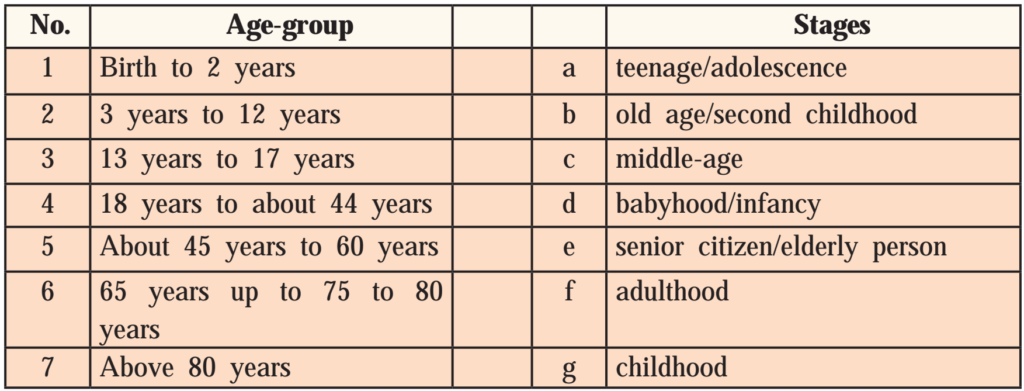
Ans. (1 – d), (2 – g), (3 – a), (4 – f), (5 – c), (6 – e), (7 – b)
… FACTUAL QUESTIONS …
What is the major differernce noticed in the 5th and 6th stage of life ?
Ans. The major difference between stages 5 and 6 is the change in physical appearance as man goes from having a belly to becoming extremely thin and he has a changed voice as well.

1. Read the words in given clouds. Match them with what they signify.
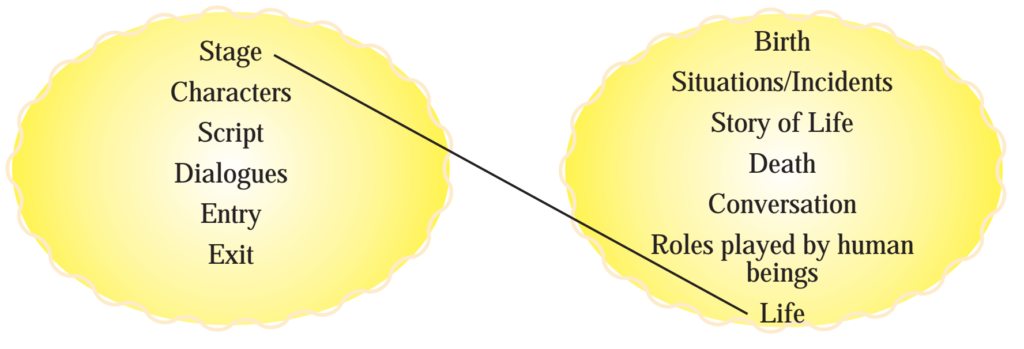
Ans.
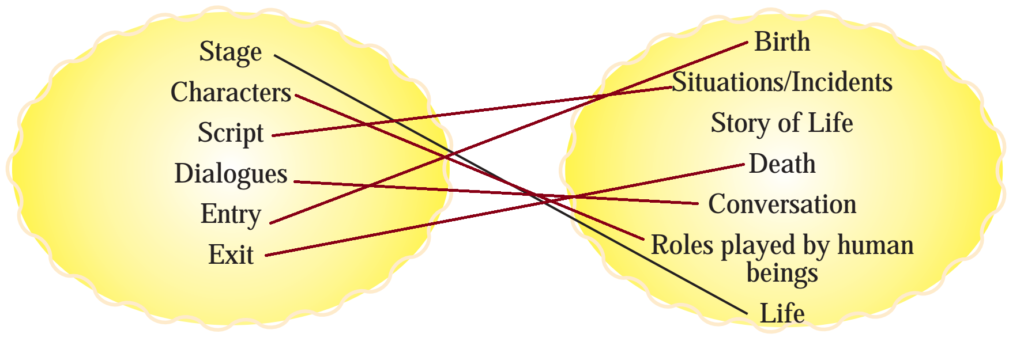
2. Read the poem carefully and complete the following table.
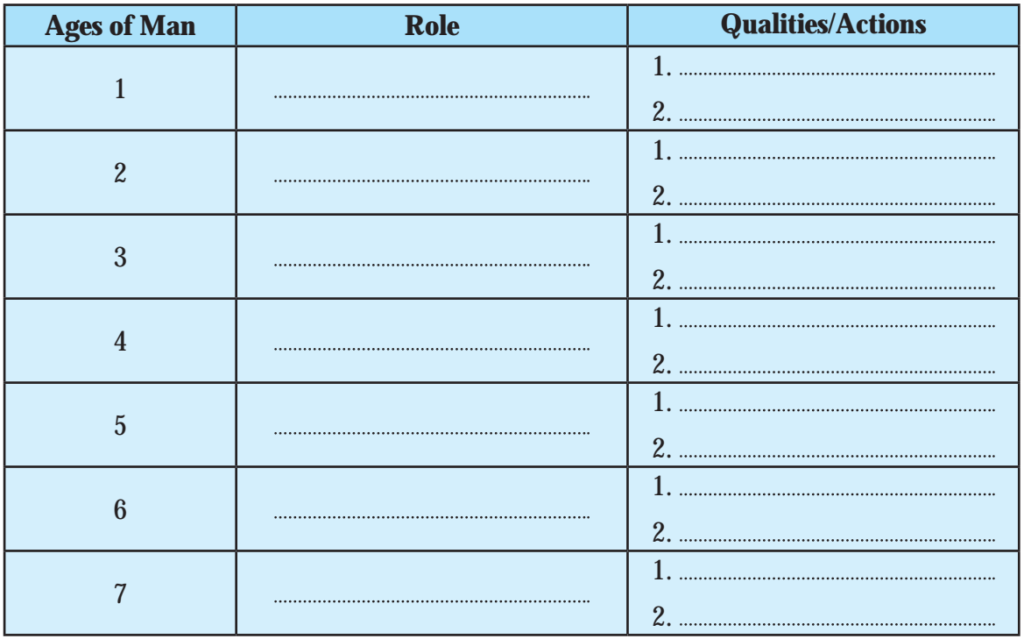
Ans.

3. Write down in your own words the differences between the following stages of a man’s life.
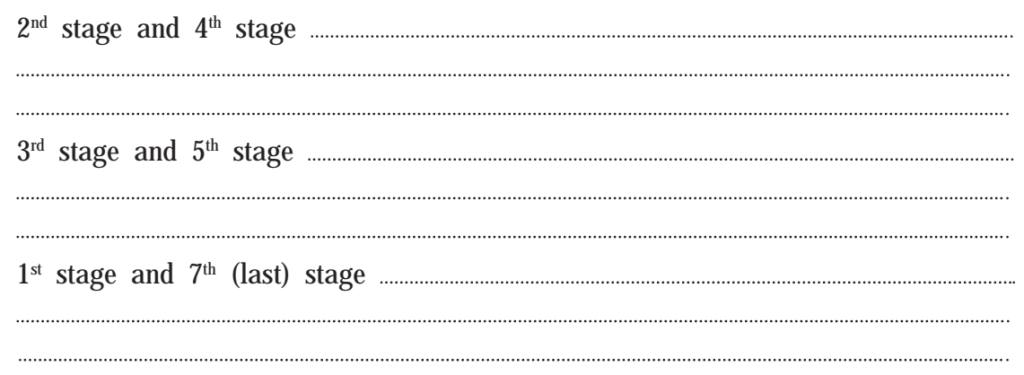
Ans.
2nd stage and 4th stage: In the second stage, as a school boy, he carries his school bag and creeps unwillingly to school whining all the way. In contrast, as a solider, he takes strange oaths and has a beard like a leopard. He is jealous of others’ successes and gets into quarrels at the drop of a hat. He is willing to put his life in danger to gain temporary reputation.
3rd stage and 5th stage: In the 3rd stage, as a lover he sighs like a furnace in separation. He writes sad poems and describes his beloved’s beauty. In the 5th stage, however, he is the justice who has a fair round belly, as he is well fed and full. He has severe eyes and his beard is formal. He uses wise sayings and gives examples to explain his points.
1st (stage) and 7th (last stage): In the first stage, the infant mewls and vomits on the nurse’s arms. In the last stage, i.e. old age, he experiences second childhood. He is without proper eyesight and taste. He needs help with everything he does just like he did as an infant. Therefore, these two stages are strangely similar. It is like going back to the first stage one started from when one was born.
4. Pick out lines that contain Imagery (a picture created in the mind by using words) of the following people.
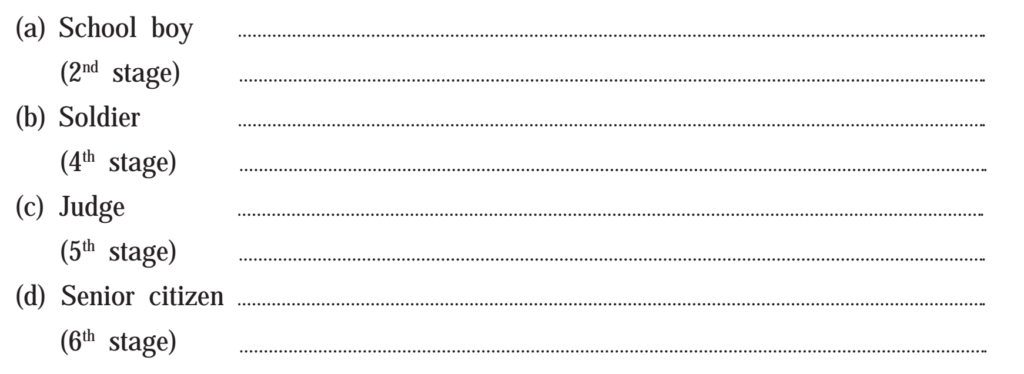
Ans.
(a) School boy (2nd stage) – Then the whining schoolboy, with his satchel, and shining morning face, creeping like snail unwillingly to school.
(b) Soldier (4th stage) – Bearded like the pard, sudden and quick in quarrel.
(c) Judge (5th stage) – In fair round belly with good capon lined, with eyes severe and beard of formal cut.
(d) Senior citizen (6th stage) – Into the lean and slippered pantaloon, with spectacle on nose and pouch on side.
5. You will notice that there is no Rhyme-scheme in the poem. It appears similar to the poem 1.1 ‘Where the Mind is Without Fear’ by Tagore.
However Tagore’s poem has no steady rhythm/meter either it is called Free
Verse. Shakespeare uses lines with a steady rhythm of 5 beats in each. It is termed
as Blank Verse. (No rhyme-scheme but uniformity in rhythm)
Copy the lines from “Ánd all the men and women merely players” to “sudden and
quick in quarrel”. Put a stress mark on each of the syllables stressed in the lines as –
for example, And all the men and women merely players;
Ans.
And all the men and women merely players
They have their exits and their entrances
And one man in his time plays many parts
His acts being seven ages. At first, the infant
Mewling and puking in the nurses arms
Then the whining schoolbag with his satchel
And shining morning face creeping like snail.
Unwillingly to school. And then the lover
Sighing like a furnace with a woeful ballad
Made to his mistress eyebrow. Then a soldier
Full of strange oaths and bearded like the pard
Jealous in honour sudden and quick in quarrel
6. Think and write on your own.
(i) What is the theme/central idea of this poem?
Ans. The theme/central idea of the poem is that just like characters in a play perform their role and make an exit, in life, we must play our parts andmmake an exit. Our entrance and exit in this world,is predetermined and we have no control over it but we can do our best with what we have control over i.e. choose to play our parts or roles well. The duration of our role is not important; what is important is the impact we leave on everyone’s heart and mind while we are here by playing our parts well.
(ii) Which two stages of man described by Shakespeare sound humorous? Say why.
Ans. The fifth stage when the man is a justice and the sixth stage are humorous. Shakespeare has used vivid imagery to describe these two stages. The sight of a round-bellied justice using wise sayings and examples invokes humour. Similarly, we can actually visualize the senior citizen in loose pantaloons, spectacles on the nose and a pouch on his side. This adds humour to the otherwise serious poem.
(iii) The last (7th) stage of life sounds very sad and miserable. How can you make old age also cheerful and happy?
Ans. We can make old age cheerful and happy by living our lives to the fullest right from the time we are young. We should make sure to create enough cheerful memories when we are young, so that when we visit the older days in our minds in old age, we have a smile on our face. Moreover, knowing that death is inevitable and accepting old age with grace is the way to a happy life.
7. (A) The poem is entirely metaphorical. Pick out the comparisons from the poem.
(a) world – stage
(b) actors – men and women
(c) birth and death – entrance and exit
(d) school boy – snail
(e) the lover’s sigh – furnace
(f) spotted leopard – soldier
(g) last stage (old age) – second childhood
(B) Pick out from the poem two examples of each.
(i) Simile:
(a) creeping like snail
(b) And then the lover sighing like furnace
(ii) Onomatopoeia:
(a) Then the whining schoolboy
(b) And whistles in his sound
(iii) Alliteration:
(a) His youthful hose, well saved a world too wide
(b) Made to his mistress’ eyebrows
(iv) Metaphor:
(a) all the world’s a stage
(b) And all men and women merely players
(v) Inversion:
(a) And one man play many parts in his time
(b) Creeping like snail, unwillingly to school
(vi) Transferred epithet:
(a) Made to his mistress eyebrow
(b) Into the lean and slippered pantaloon
8. Read the summary of the play ‘As You Like It’ by William Shakespeare using the Internet. Find out which character has narrated the above poem and on what occasion. Also, make a list of all the characters of the play.
Ans.
The character who has narrated the above poem in the play ‘As You Like It’ by William Shakespeare is Jacques. He narrates it in Act II, Scene VII in reply to an idea given by Orlando.
Some of the other characters in the play are Celia, Rosalind, Orlando, Oliver. Duke Senior, Duke Frederick, Touchstone, etc.
9. Read the poem again and write an appreciation of the poem in a paragraph format. (Refer to page no. 5)
Ans.
Title: All The World’s A Stage
Poet: William Shakespeare (from his play ‘As you like it’)
Shakespeare has compared the stages in the life of man to a role an actor would play on a theatre stage. All men and women, take an entrance as they are born and exit the stage of life as they die. There is no rhyme scheme but the poem is in iambic pentameter.
Figures of speech: Simile ‘sighing life furnace’, ‘bearded like the pard’;
Metaphor ‘And all the men and women merely players’;
Alliteration ‘with a woeful ballad’, ‘quick in quarrel’
Personification/ Metaphor ‘Even in cannon’s mouth’
Inversion ‘with eyes severe and beard of formal cut’ add to the beauty of the poem.
The poem is satirical and humourous in tone. Shakespeare has vividly described all the stages of man comparing him to a snail, leopard, soldier and justice, among other things. This gives a rich visual feel to the poem. The poem implies the meaning that man should not be too proud when young as he has to grow old.
My Favourite lines are ‘And all the men and women merely players. They have their exits and their entrances’
I like the poem because it is a beautifully descriptive allegory that teaches us how to enjoy and appreciate every stage and moment of our lives and make the most of what we have.